Decolonizing the Gender and Land Rights Debate in India: Considering Religion and More-than-Human Sociality in Women’s Lived Land Relatedness
Abstract
:1. Introduction
2. Materials and Methods
3. Women and Land Rights in the Literature—Why Do Laws Fail?
3.1. Indian Scholarship on Gender and Land Rights
In relation to property, women are defined as dependent because they only have access to the most important forms of wealth-producing property via their relations with men. Women are largely disqualified from exercising direct control over the most important form of property (land) by inheritance rules which favor male heirs, and this disqualification is related to their roles as wives and sisters. A good sister does not claim the land which her brother might inherit. A good wife participates in the control which her husband exercises over any land he may own, but does not command rights in land independently of his family.
Land has been and continues to be the most significant form of property in rural South Asia. It is a critical determinant of economic well-being, social status, and political power. However, there is substantial evidence that economic resources in the hands of male household members often do not benefit female members in equal degree. Independent ownership of such resources, especially land, can thus be of crucial importance in promoting the well-being and empowerment of women.
It means gaining control over sources of power like material assets and self-assertion, and ability to take part in the making of decisions that affect their lives. For this, women must have equal opportunities, equal capabilities, and equal access to resources. Such a manifestation would ultimately mean a redistribution of existing power relations and finally a challenge to the patriarchal ideology and male dominance, as the concept of women empowerment is associated with gender equality.
3.2. Dissenting Voices in the Women’s Rights Debate
4. What Do Women Say? Weighing the Pros and Cons of Making a Legal Land Claim
4.1. The Impracticability of Owning Land in the Natal Family
4.2. Having Access to Land in Their Conjugal Family
4.3. The Benefits of Good Relationships with Brothers
4.4. Women’s Empathy with Land as a Living Being
5. What Do Women Do? Caring for Land through Religious Practices
6. Conclusions
Author Contributions
Funding
Institutional Review Board Statement
Informed Consent Statement
Data Availability Statement
Conflicts of Interest
| 1 | Swelsen completed her bachelor’s degree at Radboud University in Nijmegen. |
| 2 | For the sake of the argument in this paper, we focus on this point that Agarwal persistently brings to the fore. However, her analysis has multiple dimensions, including addressing factors at the macro level that constrain women when it comes to exercising their legal claims, such as legal pluralism and male dominance in administrative and judicial public services. Generally, to date, feminist scholars in the land rights debate still follow Agarwal’s (1994) main argument that patriarchal values and practices supported by customary law prevent women from claiming their inheritance. |
| 3 | Our intention is not to present this as a sharp duality but to distinguish the information we received in arranged interview settings from the insights we gained from participating in women’s ritual activities. Women’s songs, stories, poetry, and prayers are still part of women’s rituals to celebrate mother soil. These verbal expressions show there is a continuum rather than a rupture between (speech) language and (ritual) action. That said, they mostly praise, discuss, or comment on human kinship rather than the more-than-human kinship we focus on in this section (for women’s songs accompanying the rituals, see Notermans (2019)). |
| 4 | This ritual is done during the festival of Dasha Mata, another goddess symbolizing feminine power and fertility, and equally associated with mother soil and Lakshmi. |
References
- Agarwal, Bina. 1994. A Field of One’s Own: Gender and Land Rights in South Asia. Cambridge: Cambridge University Press. [Google Scholar]
- Agarwal, Bina. 2003a. Gender and land rights revisited: Exploring new prospects via the state, family and market. Journal of Agrarian Change 3: 184–224. [Google Scholar] [CrossRef]
- Agarwal, Bina. 2003b. Women’s land rights and the trap of neo-conservatism: A response to Jackson. Journal of Agrarian Change 3: 571–85. [Google Scholar] [CrossRef]
- Agarwal, Bina. 2005. Landmark step to gender equality. The Hindu. Available online: http://binaagarwal.com/popular%20writings/Landmark%20Step%20to%20Gender%20Equality%20TheHindu_25sep05.pdf (accessed on 10 January 2022).
- Bates, Karine. 2004. The Hindu Succession Act: One law, plural identities. The Journal of Legal Pluralism and Unofficial Law 50: 119–44. [Google Scholar] [CrossRef] [Green Version]
- Berry, Kim. 2011. Disowning dependence: Single women’s collective struggle for independence and land rights in northwestern India. Feminist Review 98: 136–52. [Google Scholar] [CrossRef]
- Bird-David, Nurit. 2018. Persons or Relatives? Animistic Scales of Practice and Imagination. In Rethinking Relations and Animism: Personhood and Materiality. Edited by Miguel Astor-Aguilera and Graham Harvey. London: Routledge, pp. 25–34. [Google Scholar]
- Carsten, Janet. 2004. After Kinship. Cambridge: Cambridge University Press. [Google Scholar]
- Chandran, Rina. 2016. Forced by Tradition to Give Up Inheritance, Indian Women Embrace Property Ownership. Reuters. Available online: www.reuters.com/article/india-landrights-women-idINKBN12X1QK (accessed on 30 April 2021).
- Chowdhry, Prem, ed. 2017. Understanding Women’s Land Rights: Gender Discrimination in OWNERSHIP. Land Reforms in India: Volume 13. Los Angeles: Sage. [Google Scholar]
- 2013. Women’s Right to Inherit Land in India. Devex. Available online: www.devex.com/news/sponsored/women-s-right-to-inherit-land-in-india-81203 (accessed on 10 January 2022).
- Emerson, Robert, Rachel Fretz, and Linda Shaw. 1995. Writing Ethnographic Fieldnotes. Chicago: university of Chigaco Press. [Google Scholar]
- Feder, Gershon, and Akihiko Nishio. 1999. The benefits of land registration and titling: Economic and social perspectives. Land Use Policy 15: 25–43. [Google Scholar] [CrossRef]
- Fitzgerald, Timothy. 1997. A critique of “religion” as a cross-cultural category. Method &Theory in the Study of Religion 9: 91–110. [Google Scholar]
- George, Rachel. 2013. Women Are Being Denied the Right to Inherit Land in India. Mic. Available online: www.mic.com/articles/51687/women-are-being-denied-the-right-to-inherit-land-in-india (accessed on 30 April 2021).
- Glaser, Barney, and Anselm Strauss. 1967. The Discovery of Grounded Theory: Strategies for Qualitative Research. Mill Valley: Sociology Press. [Google Scholar]
- Govindrajan, Radhika. 2018. Animal Intimacies: Interspecies Relatedness in India’s Central Himalayas. Chicago: The University of Chigaco Press. [Google Scholar]
- Gupta, Akhil. 2000. Postcolonial Developments: Agriculture in the Making of Modern India. Durham: Duke University Press. [Google Scholar]
- Haraway, Donna. 2003. The Companion Species Manifesto: Dogs, People, and Significant Otherness. Chicago: Prickly Paradigm Press. [Google Scholar]
- Jackson, Cecile. 2003. Gender analysis of land: Beyond land rights for women? Journal of Agrarian Change 3: 453–80. [Google Scholar] [CrossRef]
- Jackson, Mark, ed. 2018. Coloniality, Ontology and the Question of the Posthuman. London: Routledge. [Google Scholar]
- Jacobs, Susie. 2017. Beneficial for women? Global trends in gender, land and titling. In Gender and Rural Globalization: International Perspectives on Gender and Rural Development. Edited by Bettina Bock and Sally Shortall. Wallingford: CABI, pp. 322–36. [Google Scholar]
- Kowalski, Julia. 2021. Between gender and kinship: Mediating rights and relations in North Indian NGOs. American Anthropologist 123: 330–42. [Google Scholar] [CrossRef]
- Mathur, Kanchan. 2017. Persisting inequalities: Gender and land rights in Rajasthan. In Understanding Women’s Land Rights: Gender Discrimination in Ownership. Land Reforms in India: Volume 13. Edited by Prem Chowdhry. Los Angeles: Sage, pp. 296–324. [Google Scholar]
- Merchant, Carolyn. 2020. The Anthropocene and the Humanities: Form Climate Change to a New Age of Sustainablility. New Haven: Yale University Press. [Google Scholar]
- Moore, Henrietta. 1994. A Passion for Difference: Essays in Anthropology and Gender. Cambridge: Polity. [Google Scholar]
- Moore, Jason. 2016. Anthropocene or Capitalocene?: Nature, History, and the Crisis of Capitalism. Oakland: PM Press. [Google Scholar]
- National Portal of India. 2021. Available online: www.india.gov.in/topics/agriculture (accessed on 29 December 2021).
- Notermans, Catrien. 2019. Prayers of cow dung: Women sculpturing fertile environments in rural Rajasthan (India). Religions 10: 71. [Google Scholar] [CrossRef] [Green Version]
- O’Reilly, Andrea. 2019. Matricentric feminism: A feminism for mothers. Journal of the Motherhood Initiative 10: 13–26. [Google Scholar]
- Palriwala, Rajni. 1996. Negotiating patriliny: Intrahousehold consumption and authority in Northwest India. In Shifting Circles of Support: Contextualizing Gender and Kinship in South Asia and Sub-Saharan Africa. Edited by Rajni Palriwala and Carla Risseeuw. Walnut Creek: AltaMira Press, pp. 190–220. [Google Scholar]
- Pattnaik, Itishree, Kuntala Lahiri-Dutt, Stewart Lockie, and Bill Pritchard. 2018. The feminization of agriculture or the feminization of agrarian distress? Tracking the trajectory of women in agriculture in India. Journal of the Asia Pacific Economy 23: 138–55. [Google Scholar] [CrossRef]
- Rao, Nitya. 2005a. Questioning women’s solidarity: The case of land rights, Santal Parganas, Jharkhand, India. The Journal of Development Studies 41: 353–75. [Google Scholar] [CrossRef]
- Rao, Nitya. 2005b. Kinship matters: Women’s land claims in the Santal Parganas, Jharkand. The Journal of the Royal Anthropological Institute 11: 725–46. [Google Scholar] [CrossRef]
- Rao, Nitya. 2017. “Good Women Do Not Inherit Land”: Politics of Land and Gender in India. London: Routledge. [Google Scholar]
- Ribot, Jesse, and Nancy Lee Peluso. 2003. A theory of access. Rural Sociology 68: 153–81. [Google Scholar] [CrossRef]
- Rose, Deborah Bird. 1999. Indigenous ecologies and an ethic of connection. In Global Ethics and Environment. Edited by Nicholas Low. London: Routledge, pp. 175–87. [Google Scholar]
- Sharma, Ursula. 1980. Women, Work, and Property in North-West India. London: Tavistock Publications. [Google Scholar]
- Shiva, Vandana. 2016. Staying Alive: Women, Ecology, and Development. Berkeley: North Atlantic Books. [Google Scholar]
- Spradley, James. 1980. Participant Observation. New York: Holt, Rinehart and Winston. [Google Scholar]
- Srivastava, Nisha. 2011. Feminisation of agriculture: What do survey data tell us? Journal of Rural Development 30: 341–59. [Google Scholar]
- Stringer, Martin. 2008. Contemporary Western Ethnography and the Definition of Religion. London: Continuum. [Google Scholar]
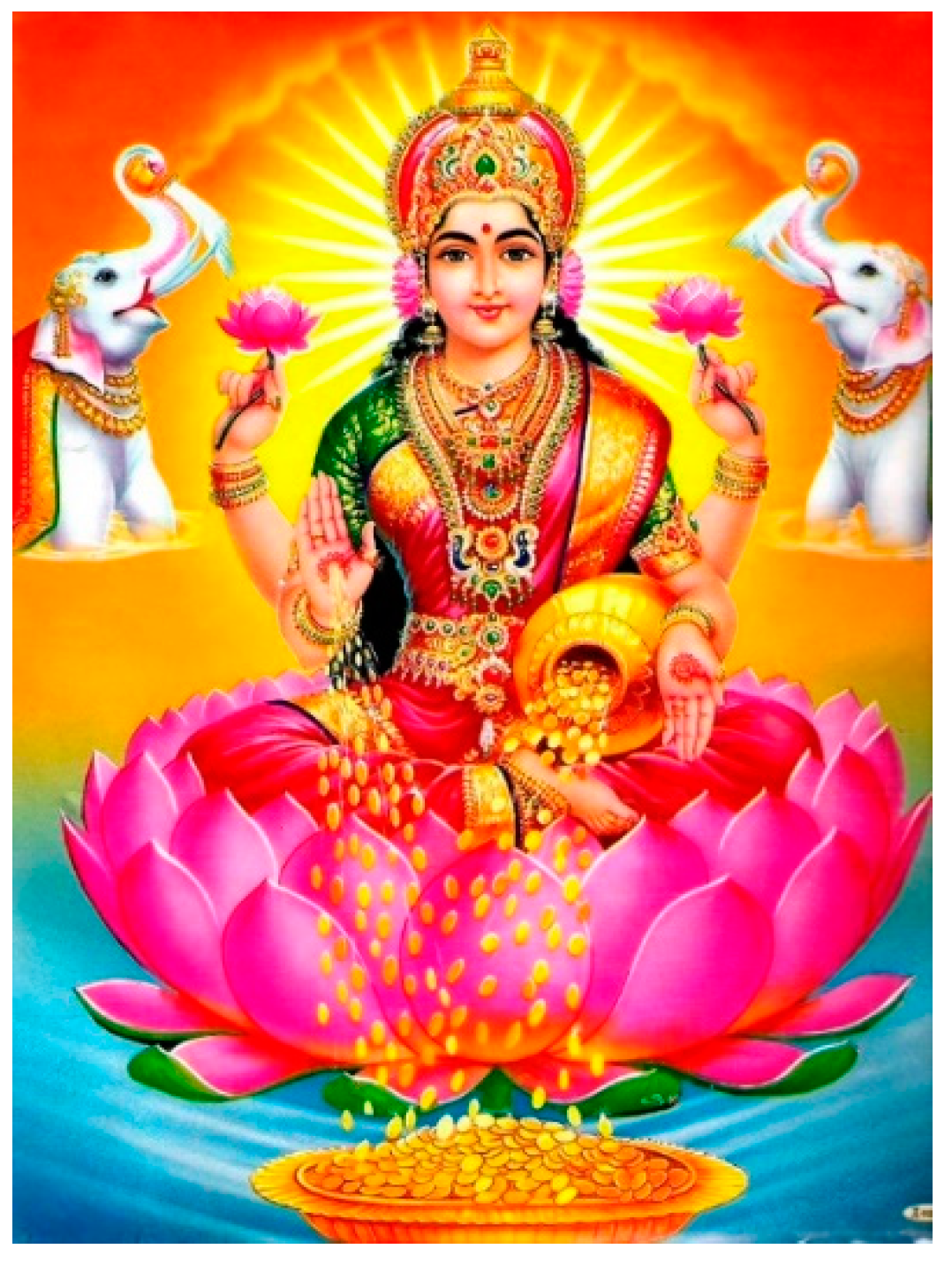
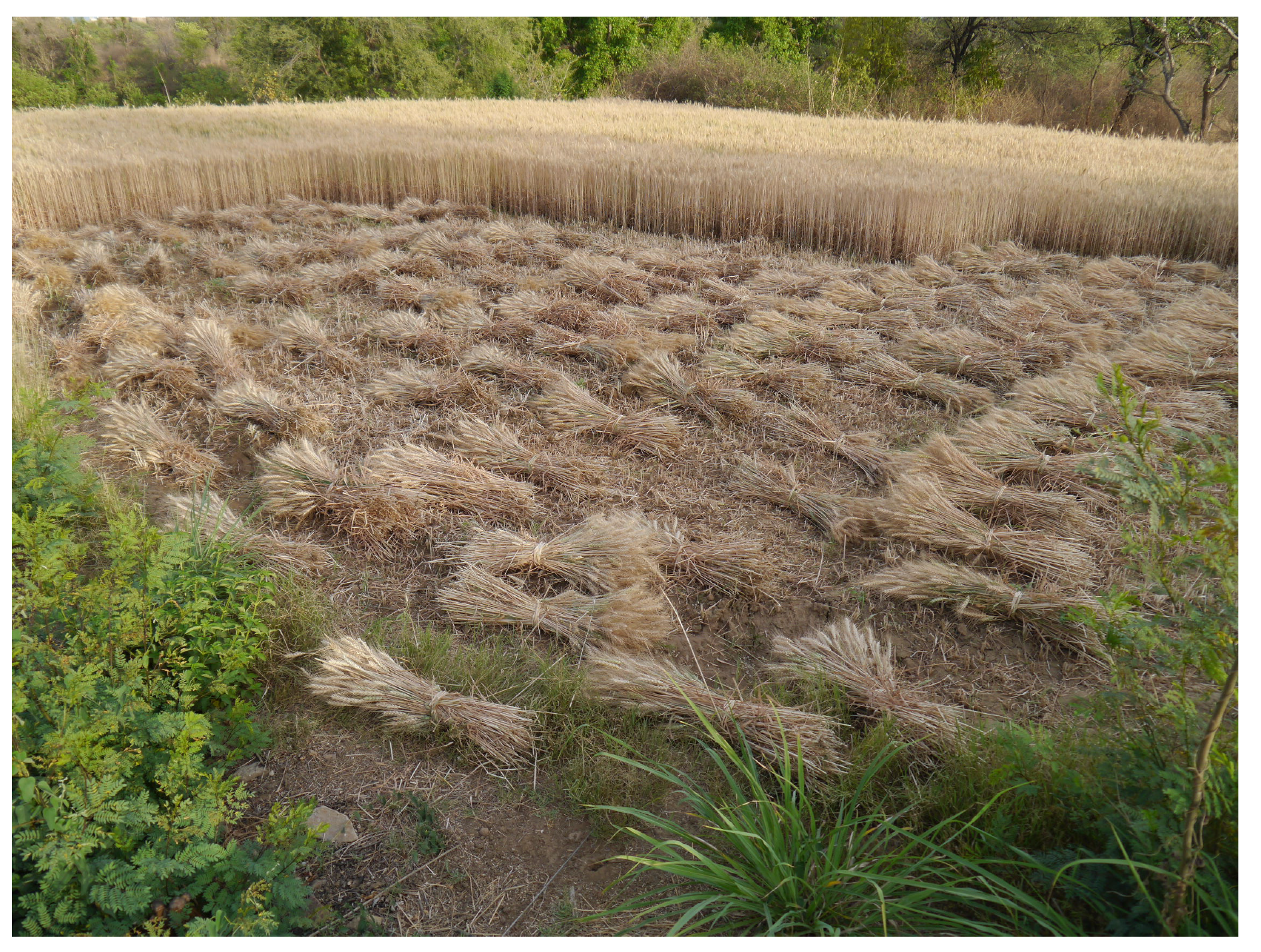
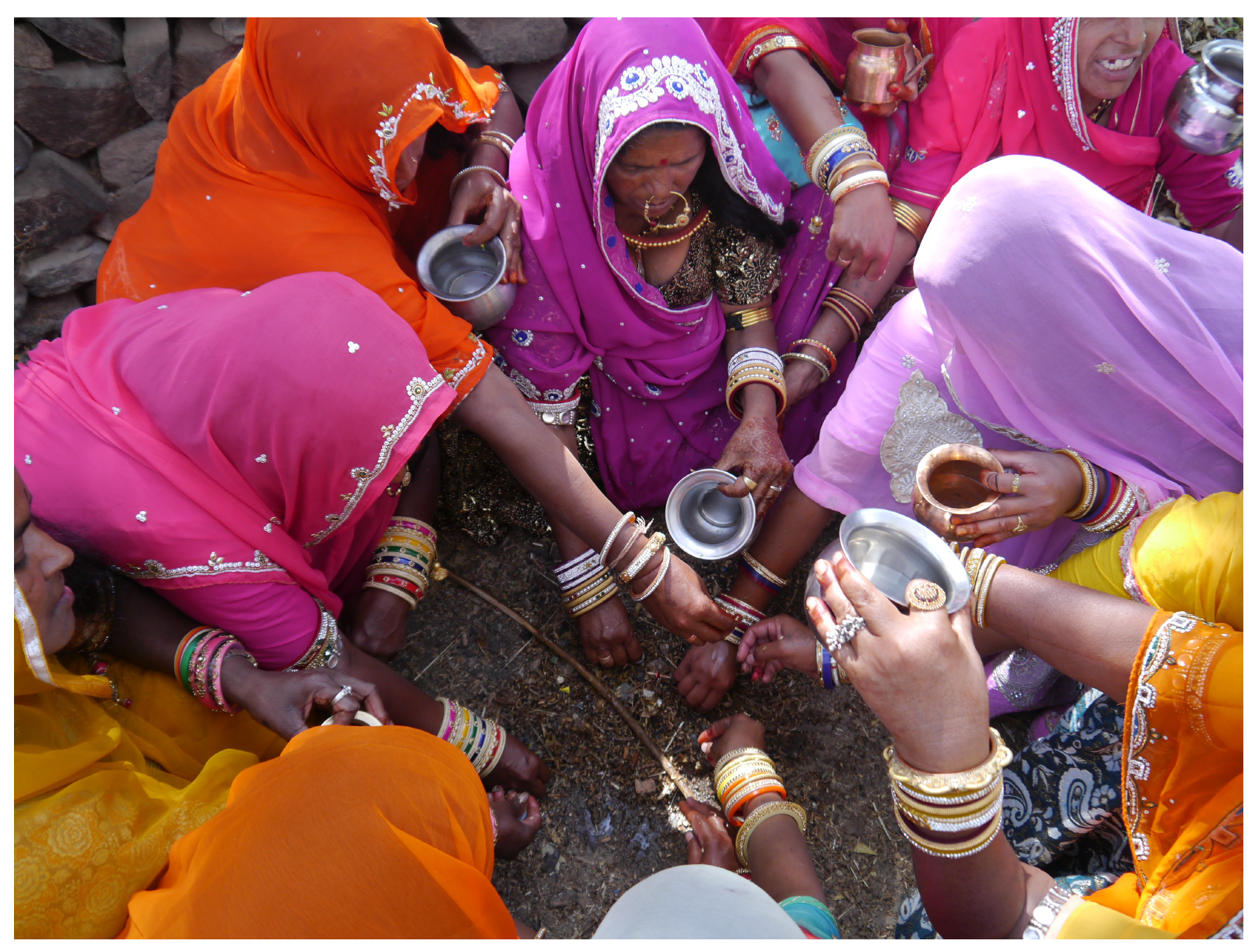
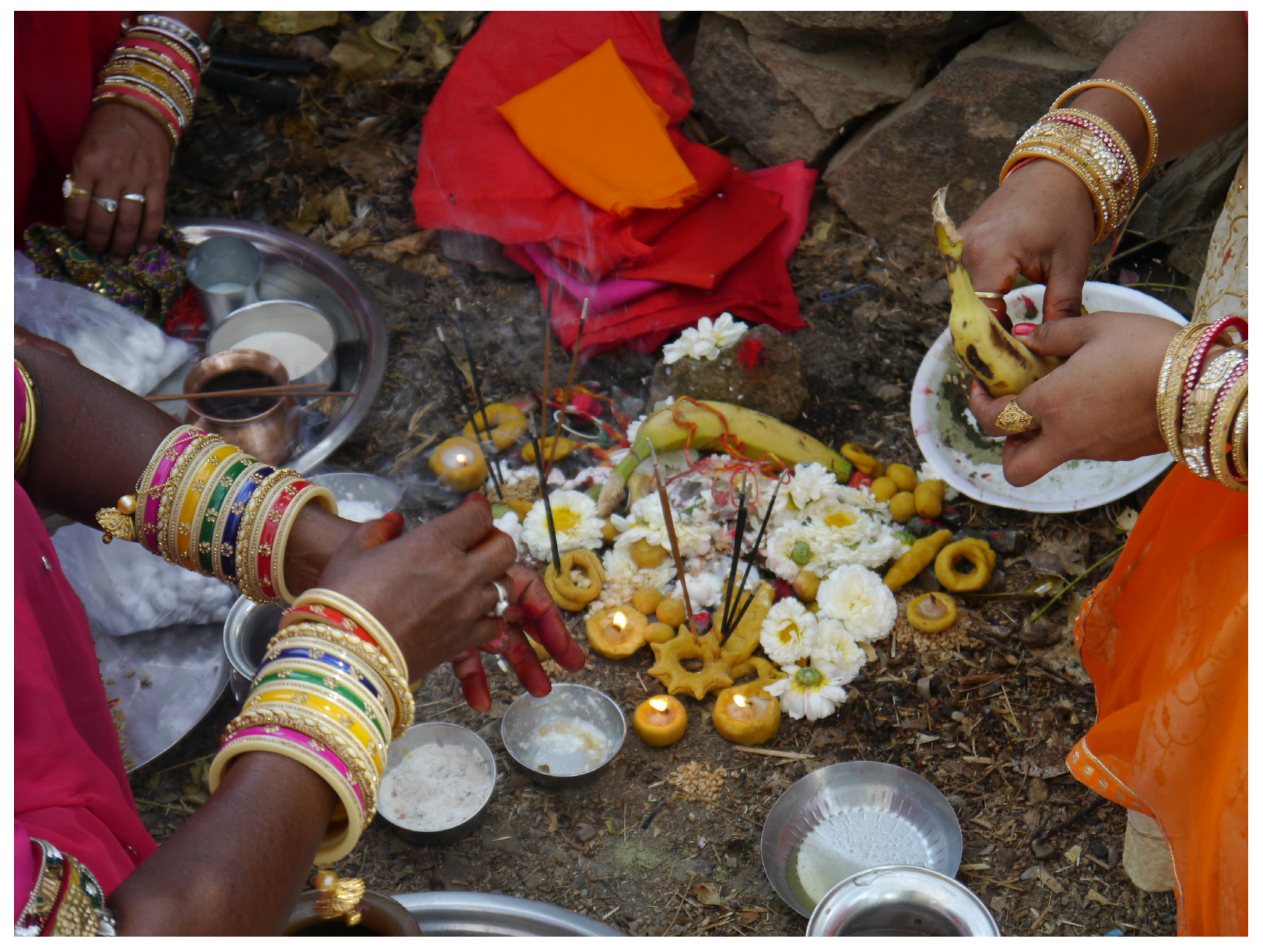
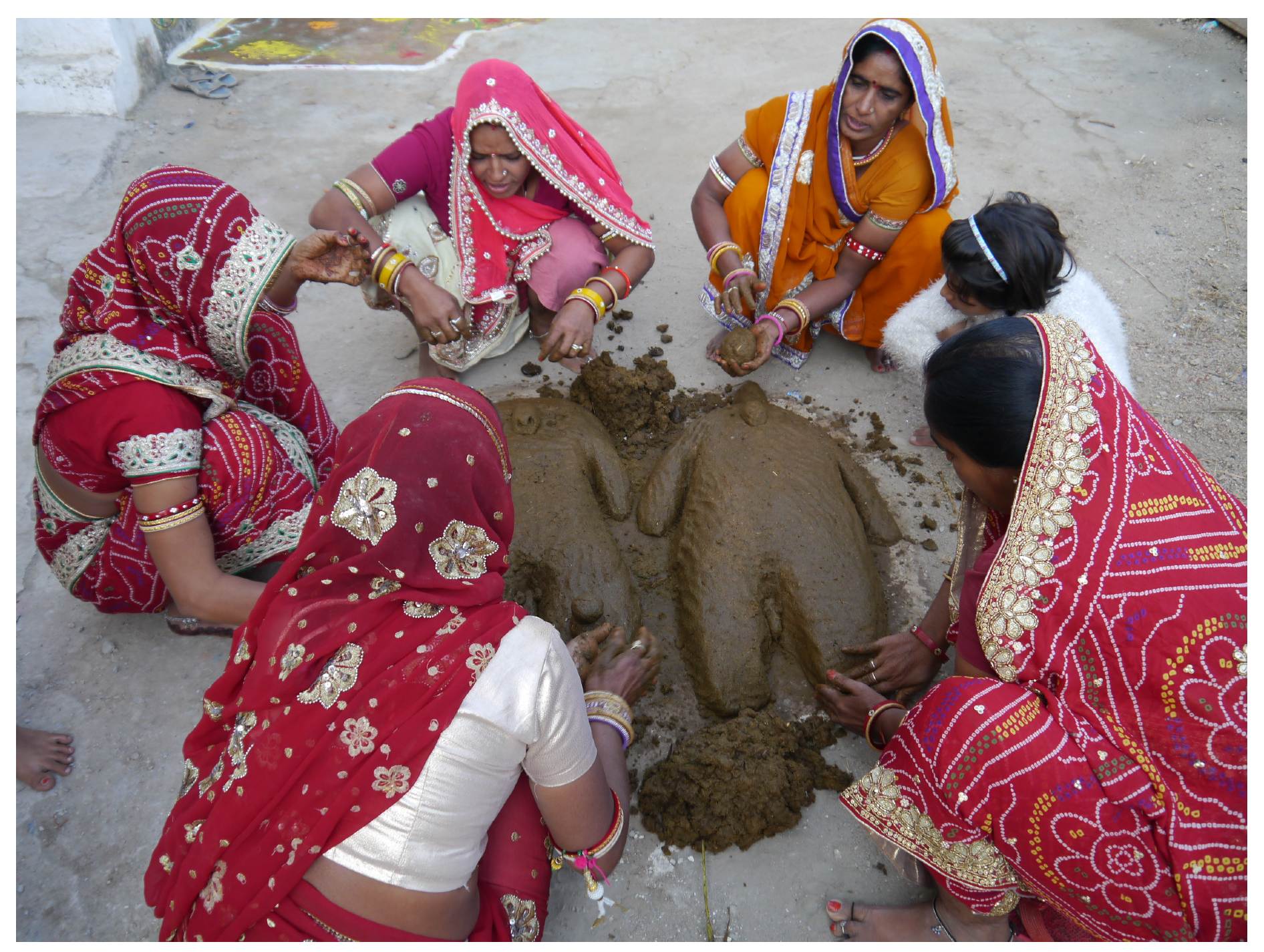
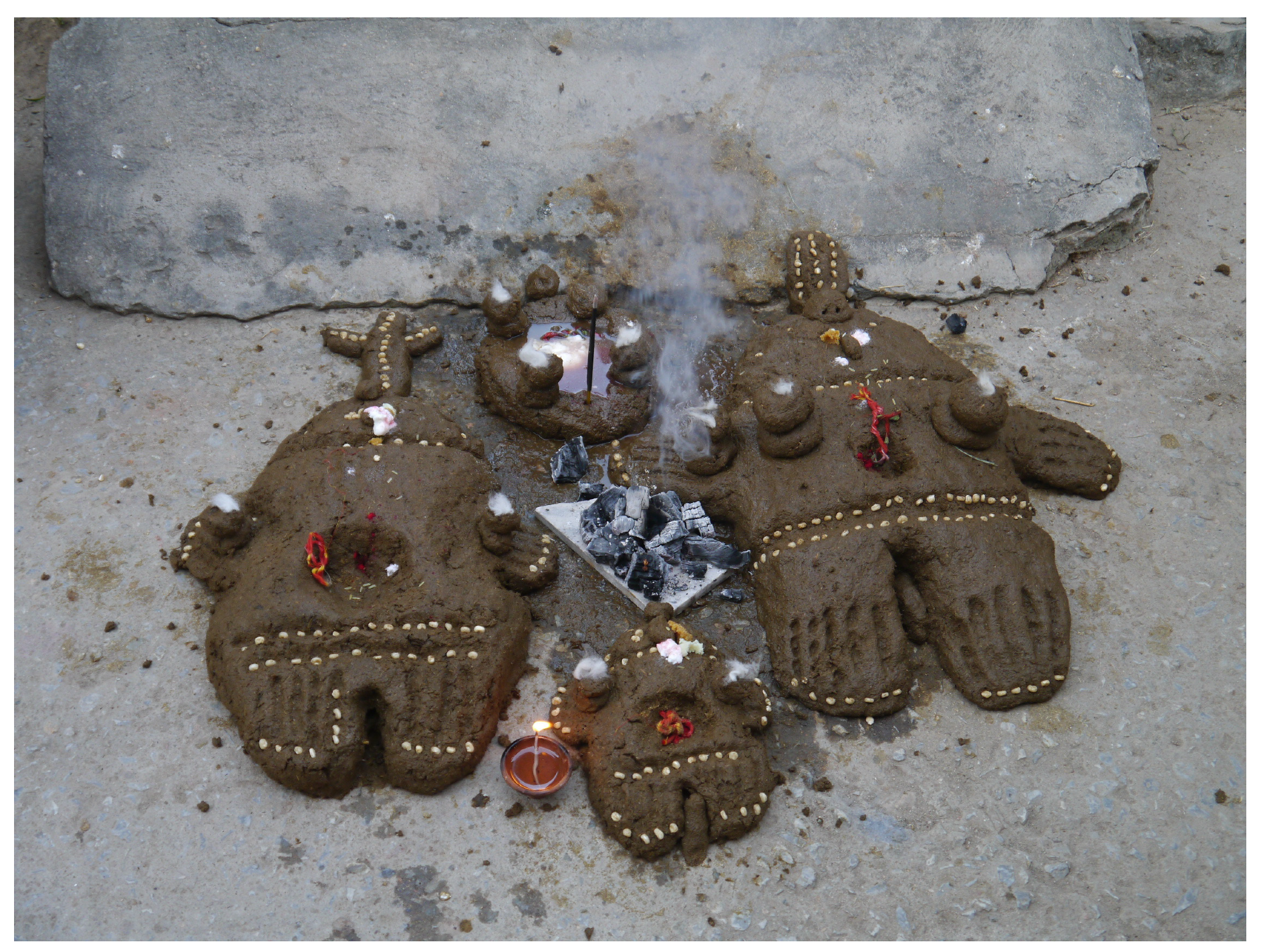
Publisher’s Note: MDPI stays neutral with regard to jurisdictional claims in published maps and institutional affiliations. |
© 2022 by the authors. Licensee MDPI, Basel, Switzerland. This article is an open access article distributed under the terms and conditions of the Creative Commons Attribution (CC BY) license (https://creativecommons.org/licenses/by/4.0/).
Share and Cite
Notermans, C.; Swelsen, L. Decolonizing the Gender and Land Rights Debate in India: Considering Religion and More-than-Human Sociality in Women’s Lived Land Relatedness. Religions 2022, 13, 254. https://doi.org/10.3390/rel13030254
Notermans C, Swelsen L. Decolonizing the Gender and Land Rights Debate in India: Considering Religion and More-than-Human Sociality in Women’s Lived Land Relatedness. Religions. 2022; 13(3):254. https://doi.org/10.3390/rel13030254
Chicago/Turabian StyleNotermans, Catrien, and Luna Swelsen. 2022. "Decolonizing the Gender and Land Rights Debate in India: Considering Religion and More-than-Human Sociality in Women’s Lived Land Relatedness" Religions 13, no. 3: 254. https://doi.org/10.3390/rel13030254
APA StyleNotermans, C., & Swelsen, L. (2022). Decolonizing the Gender and Land Rights Debate in India: Considering Religion and More-than-Human Sociality in Women’s Lived Land Relatedness. Religions, 13(3), 254. https://doi.org/10.3390/rel13030254






